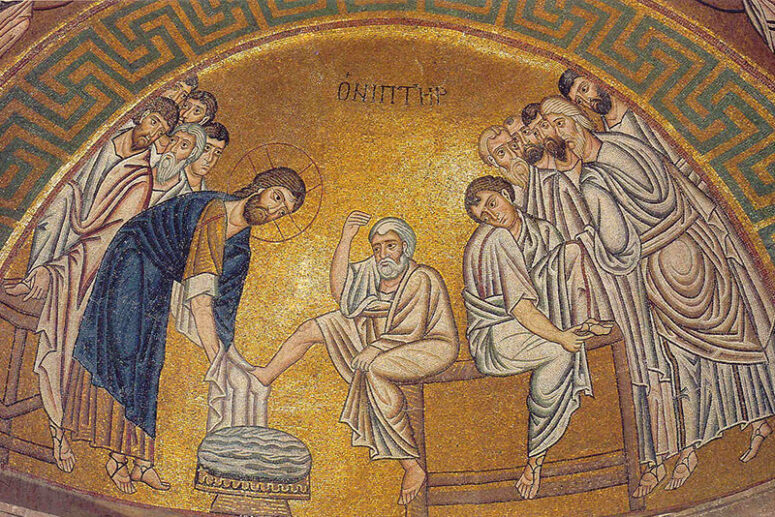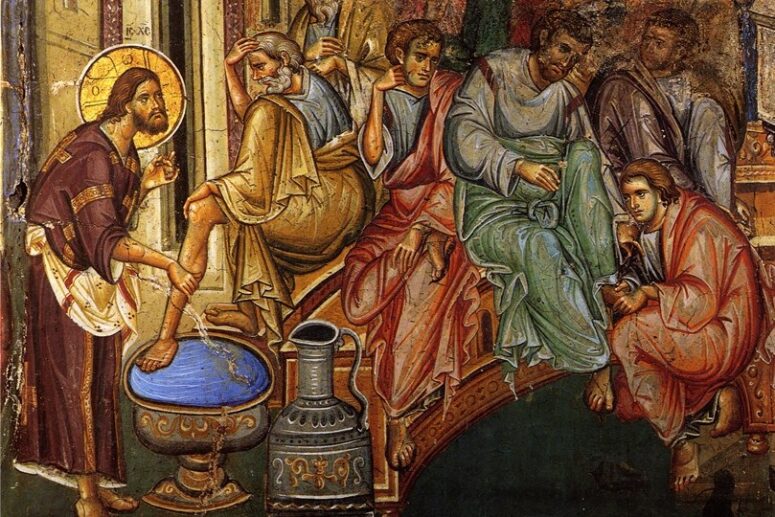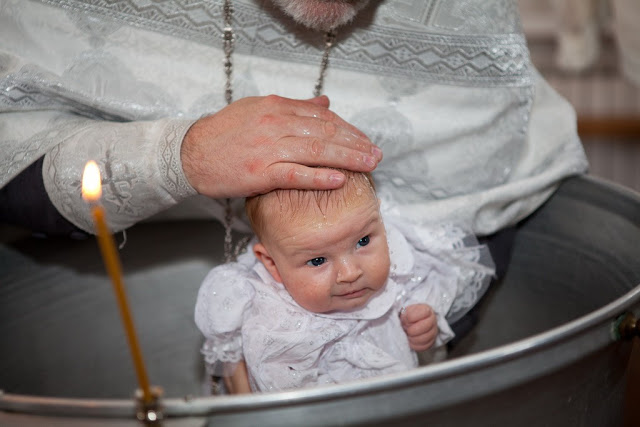
The Last Supper of Christ is so mysterious, so deep and so infinitely important that our hearts become filled with trembling. During this Holy Supper, the Lord Jesus Christ washed the feet of His disciples and established the Sacrament of Holy Communion, Himself giving it for the first time to His disciples.
The Lord manifested His greatest humility in deed, washing the dusty feet of the disciples, who were greatly amazed by this: “How can it be that our great Teacher, our Lord will wash our feet!” In perplexity, they all trembled and silently obeyed the Lord Jesus Christ until Peter with his fiery nature exclaimed: “Lord, do You wash my feet?” And the Lord replied: “What I do you do not realize now, but you will understand hereafter.” – “Never shall You wash my feet!” – “If I do not wash you, you have no part with Me.”
Hearing these words, Peter shuddered. “Lord, then wash not only my feet, but also my hands and my head”. The Lord answered, “He who has bathed has nothing more to wash than his dusty feet.” And having finished this wondrous, mysterious and great deed, the Lord Jesus Christ said, “Behold, I, your Lord and Teacher, have given you an example of how you ought to act. If I, your Lord, have washed your feet, then you must do the same to one another. ” (See John 13: 4-15).
How amazing is this work of the Lord washing the feet of His servants! Had there been anything like this in the world before? The Lord always acted in the way that no other people used to act and spoke like no other people. Therefore, all His words should be diligently given great attention so that we may delve into their holy meaning.
“If I do not wash your feet, you will not have a part with Me.” What is the meaning of the words that the Lord said to St Peter the apostle? Why did He say these dreadful words? Is it because Peter’s natural agitation was stopping him from letting his great Teacher wash his feet? Why would he not have had a part with Christ if he had resisted Him to the end? Because he did not attach due importance to the greatness of this work of the Lord and, not understanding, dared to oppose Him. One must be deeply reverent in everything in relation to Christ and accept His every word with fear and trembling, never daring to deviate from His Divine will.

He said, “You have bathed and need only to wash your feet” (See John 13:10). It means that they still lacked something. They were cleansed, and their souls were sanctified by three years of communion with the Lord Jesus Christ and His teaching that they accepted in their hearts. They were clean. But if the Lord found it necessary to wash their dusty feet, it means that some sinful human weakness still remained in them; The Lord wanted them to be holy and blameless in everything before God. This is a lesson for us. We must always remember how much impurity we have, even after we have repented and partaken of the Body and Blood of the Lord. This impurity can only be washed away by the Lord Himself.
Also, we must always remember and fulfill the covenant of Christ: “If I, the Lord and Teacher, have washed your feet, then you must also wash one another’s feet” (John 13: 14-15). What does it mean to wash one another’s feet? It means that we must deeply humble ourselves before all people, not be exalted before anyone, serve everyone, as did the Lord Jesus Christ. This means that we must serve our neighbor in everything, fulfilling the word of the Lord: “Whoever wishes to become great among you shall be your servant.” (Matthew 20:26).
Without any disgust or fastidiousness, we must wash, bandage and heal the bodily wounds of our brothers, as disgusting, fetid and purulent as they may be. We must also show great humility and love healing the spiritual wounds of our brothers and bearing the burdens of the weak, as St Paul the Apostle commands; serving them and not ruling over them; being everyone’s servant and not giving orders to anyone.
The history of the liturgical rite of the Washing of the Feet
A Fragment of the Sermon on Maundy Thursday, May 3, 1965
Source: http://hram-vsr.ru/index.php?option=com_content&view=article&id=1593&catid=36&Itemid=82




